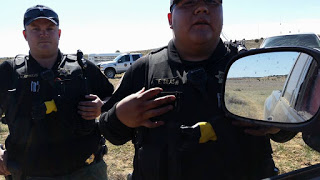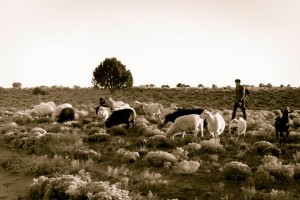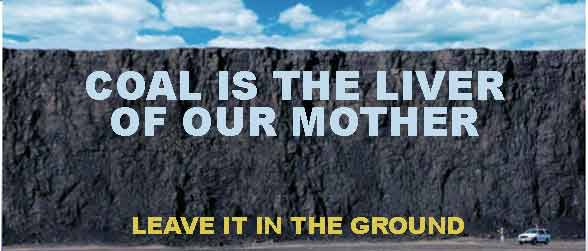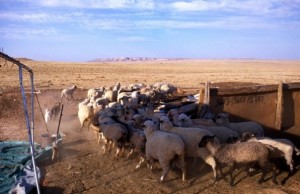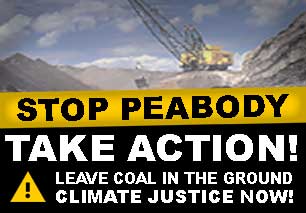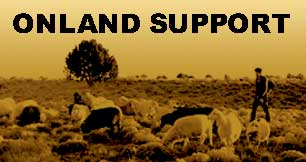“Big Mountain is Under Siege Again”–Louise Benally on Livestock Impoundments
“We are asking you to take action. Big Mountain is under siege again because Peabody Coal is losing its income from coal mining, so it is pressuring the tribal government to attack its own people. We’ve been opposed to the mining since 1974 when PL 93-531 was passed. Now with the coal companies collapsing they are trying to take the only resource we have, which is our animals to eat and sell.
They are stealing our livelihood away and holding them in pens and charging us a lot of money and refusing to bring them back to people’s homes. When the animals are taken away, people can’t return to their homes.
They are holding the animals as ransom, but we don’t have money because we don’t have a cash economy. There is no work except for the coal mine. We need human rights and justice for the environment. This is a fight for human rights — Animals are food. When they take our food what choice to we have? We are calling out to the world to help us apply public pressure. Demand animals be returned to owners and that the owners are allowed to decide how to manage the land and animals.
Call the Department of the Interior, the Department of Justice, and the Navajo Nation. The Navajo Nation refuses to help the people who are resisting relocation openly. No one is backing us up because we are resisters. This has always been stacked against us.
They are harassing and terrorizing people and when they take their animals away they can never come back to the land. They tell us we are illegally living here. We are illegal aliens basically. But I am older than PL 93-531. I was born in 1960 and that law didn’t come along until 1974. That’s why I don’t recognize it. I was here before.”—Louise Benally, Dineh, Big Mountain LouiseBenally6@gmail.com
Numbers to Call:
BIA superintendent Wendel Honanie at( 928-738-2228),
Hopi Rangers Clayton Honyumptewa at (928-734-3601),
Navajo Nation President Russell Begaye: (928) 871-6352/6353
Department of Interior at (602-379-6600)
You can donate to a livestock impoundment fund HERE. Please specify “Black Mesa Impoundements” in the designation box.
If you can come out to the land and act as a human rights observer in the face of this increased community harassment, contact blackmesais@gmail.com
Help Black Mesa Residents Get to St. Louis for Important Anti-Peabody Training and Action!
Peabody Energy is Headquartered in St. Louis…

This January, help Black Mesa residents hold them accountable!
This January, BMIS in coalition with Radical Action for Mountain Peoples’ Survival (RAMPS) and Missourians Organizing for Reform and Empowerment (MORE), will participate in organizing a month-long action training camp that culminates in non-violent direct action against the five major coal companies based in St. Louis, including Peabody Energy. (You can find out more about the action here: http://rampscampaign.
We are asking for your financial support to help cover the costs of travel for residents of Black Mesa to get to St. Louis. Their presence at the camp will help folks make connections between dirty energy production and the devastation of Indigenous communities and will ensure that climate justice is understood inherently as a struggle for Indigenous people’s survival, rights, land, and self-determination. The camp includes housing and food, so sponsoring a Black Mesa/Big Mountain resident to get there will cost $200–this includes gas money from Big Mountain to Flagstaff, and a round trip train ticket between Flagstaff and St. Louis. We are asking organizations to consider sponsoring one to two residents, and individuals to sponsor one resident, or to contribute whatever is meaningful to them–everything helps! Make checks out to “Black Mesa Indigenous Support” with “St. Louis Travel” in the memo line. Send to 3214 N. Grandview Dr. Flagstaff, AZ 86004. Your donations can be tax deductible upon request.
The Black Mesa residents travelling to St. Louis will also need sheepherders while they are away. This is another incredibly important way to make travel possible. Please consider coming out to Black Mesa to herd sheep for a travelling resident this January. If you are interested in attending the training as a participant–it will include direct action, community organizing, and media tracks–you can apply here. Please note, it is a 2-3 week commitment. The direct action at the end of the training (the 3rd week of January) will be open to the public. Stay tuned for updates on exact dates and details for the action.
Black Mesa Indigenous Support Funding & Donation Guidelines
Table of Contents:
- BLACK MESA INDIGENOUS SUPPORT FUNDING & DONATION GUIDELINES:
- THE SCOPE OF BMIS’s WORK:
- GRASSROOTS FUNDRAISING: AN IMPORTANT OPPORTUNITY TO REFLECT OUR POLITICS:
- SOLIDARITY, NOT CHARITY!
- LOCATE YOURSELF IN THE STRUGGLE:
- THE COMMUNITIES OF BLACK MESA WHERE WE FOCUS OUR SUPPORT EFFORTS:
- DISTRIBUTING SUPPORT EFFORTS EVENLY:
- FUNDRAISING FOR BLACK MESA: PROJECTS & WAYS TO SUPPORT:
- IF YOU FUNDRAISE FOR YOURSELF:
- EQUITABLE FUNDRAISING:
- THE IMPORTANCE OF REPORTBACKS:
- FUNDRAISING GUIDELINES:
- FUNDRAISING TIPS & RESOURCES:
- WE WELCOME YOUR INSIGHT:
- APPRECIATION & CLOSING:
BLACK MESA INDIGENOUS SUPPORT FUNDING & DONATION GUIDELINES:
Black Mesa Indigenous Support (BMIS) is grateful for fundraising efforts in support of the indigenous peoples of Black Mesa, AZ who are protecting their communities, ancestral homelands, future generations and the planet we all share. Black Mesa encompasses a very large area inhabited by both Dine’ (Navajo) and Hopi peoples. Primarily, BMIS focuses our support efforts with the Dine’ communities who are impacted by and resisting forced relocation policies of the US government and massive coal mining operations of Peabody Energy.
The following document provides some guidelines to help boost your fundraising efforts in support of Black Mesa. First we give a sense of the wide variety of projects supported by grassroots fundraising over the last ten plus years. The sections giving a historical account of the struggle and differentiating our model of grassroots fundraising from charity will provide context for how we approach support work and why. Be sure to check out the list of families’ projects and ways to support, a condensed list of the actual guidelines for quick reference, and lastly helpful tips and resources for fundraising. Stay posted for BMIS’s Support, Representation, & Accountability guidelines!
We hope that these guidelines will be used to help keep BMIS and the resistance communities we work with informed of all of the good work that is happening on their behalf. Keeping us informed is a way of practicing accountability, and it also helps us plan our budget and distribute incoming support as evenly as possible between the families.
We want to acknowledge that some of you reading this may already be aware of the points we’re raising. You may be from Black Mesa. The supporter network is very diverse, some supporters are relatives of Black Mesa residents, some come from wealthy white families, while others are working and middle class people of all races, some are genderqueer, some are rural and some urban – everyone has varying access to power, privilege, and resources. Since we work with supporters from a diversity of class and political backgrounds, we are trying to make this document relevant to everyone, simultaneously recognizing it will be more necessary and useful to some.
Those of us in the BMIS collective do not claim to have all the answers, however we’ve learned a lot along the way, sometimes from mistakes we’ve made, and by taking direction from families. This document is a reflection of that. It’s a work in progress and we hope it continues to grow.
We welcome your insight, critiques, and questions. We hope that these documents spark a critical yet constructive dialogue concerning the challenges that we face as we engage in social transformation.
THE SCOPE OF BMIS’s WORK:
Consistently for the past 20 years the power of grassroots funding has put firewood, nutritious food, and other supplies into the hands of 100 plus families in resistance every fall season. BMIS has been involved in the annual fall-season caravans since our inception in 1998. With the guidance of residents, we have branched off to coordinate our own annual fall and spring caravans since 2008, while still being in collaboration with fellow support groups who organize them. We make an effort to purchase wood from the local community, and obtain wood permits for wood crews. Supporters and families have worked together in rebuilding or doing repairs on 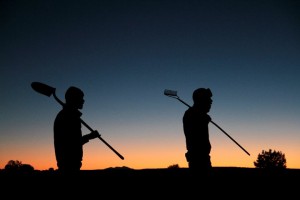 homes; dozens of corals and a ton of other construction projects have been completed. Community roads have been restored. Dozens of vehicles have been fixed, either by purchasing necessary parts or by sponsoring mechanics to come to Black Mesa and work with people there. Hundreds of people have come out to herd sheep. Community members — phone and gas have been financially sponsored so that they can check in with their relatives throughout the hundreds of miles that their communities encompasses. Community meetings, gatherings, and feasts have been sponsored or made possible — purchasing local mutton and compensating the cooks. Funds have sponsored elders and second generation resisters (residents and relatives) of Black Mesa to attend speaking engagements, protests, and conferences around the country in an effort to amplify the voices of those from Black Mesa, so that they can network, and to make the resistance to forced relocation and massive coal mining operations at Black Mesa more visible in movements for social and environmental justice. Currently funds are being used being raised to support family members in making a documentary about water rights on Black Mesa.
homes; dozens of corals and a ton of other construction projects have been completed. Community roads have been restored. Dozens of vehicles have been fixed, either by purchasing necessary parts or by sponsoring mechanics to come to Black Mesa and work with people there. Hundreds of people have come out to herd sheep. Community members — phone and gas have been financially sponsored so that they can check in with their relatives throughout the hundreds of miles that their communities encompasses. Community meetings, gatherings, and feasts have been sponsored or made possible — purchasing local mutton and compensating the cooks. Funds have sponsored elders and second generation resisters (residents and relatives) of Black Mesa to attend speaking engagements, protests, and conferences around the country in an effort to amplify the voices of those from Black Mesa, so that they can network, and to make the resistance to forced relocation and massive coal mining operations at Black Mesa more visible in movements for social and environmental justice. Currently funds are being used being raised to support family members in making a documentary about water rights on Black Mesa.
There is an array of other needs that have been funded by grassroots fundraising: getting people’s livestock back which have been impounded by tribal governments; for legal fees, and bereavement/funeral costs. Additionally it’s worth mentioning that the power of grassroots organizing and fundraising also creates holistic clinics on Black Mesa, which has been separate from BMIS’s work. Our overhead is extremely low. Nearly all of BMIS’s funds go to the communities that we are working in support of. We are an all-volunteer collective. The costs we do have include occasional phone bills mainly during the times of the caravans, repairs for BMIS trucks used on Black Mesa, community feasts that supporters are invited to, and very little else. Most of the time we rely on our community connections & creativity to keep any organizational expenses at a minimum.
All of the projects are at the request and guidance of the community. If you fund raise and give directly to a family, please let us know so we can focus resources elsewhere. Our involvement and communication with community members helps maintain a check and balance for how funds are evenly distributed.
We want to acknowledge that the supporter network plays one small part in addressing the needs of individuals & whole communities impacted by the personal and the devastating impacts of colonialism and genocide. We cannot reach everybody that we’d like to.
GRASSROOTS FUNDRAISING: AN IMPORTANT OPPORTUNITY TO REFLECT OUR POLITICS: Fundraising provides an opportunity to practice our politics in concrete and meaningful ways. It needs to be addressed with the same attention and thoughtfulness as other aspects of our work. Since we are a grassroots, all-volunteer collective and network, we do not receive nor rely on any institutional funding for support efforts, but instead count on each participant’s ingenuity, creativity, and hard work to make it all come together. A volunteer-only model is most in alignment with our values of fostering committed allyship in movements led by people most impacted by colonialism, racism, and ecological destruction (in this case, the resistance communities of Black Mesa) . That means doing this work not based on income and not relying on large donors, foundations, and so forth who then have control over the work, and unintentionally or intentionally can turn resistance movements into organizations that work within instead of posing a direct threat to oppressive institutions.
The questions of who is raising money for whom, and why, is super important. As portion of our vision states: We see ourselves as part of a people-powered uprising for a healthy planet liberated from colonialism, fossil fuel extraction, exploitative economies, racism, and oppression for our generation and generations to come. We value relationships built around principles of mutualism, accountability, and innovation. To back this up, we think it’s necessary to acknowledge institutional racism; it’s roots in capitalism, and the many ways in which this system has always been based on white supremacy. Centuries of colonization, genocide, and systems of oppression have broken trust. This history continues to play out even within well-intentioned social movements. The wealth created from the theft of indigenous land, labor of African captives and war on Mexico made the European American colonial owners a very wealthy class of people, and provided the capital that created capitalism in the United States*.
The ongoing illegal expropriation of natural resources and labor, theft of territory, and genocide committed against the indigenous peoples, as well as the militarization of the border and prison industrial complex, still continues to foster the growth and accumulation generated by globalized free-market capitalism.
SOLIDARITY, NOT CHARITY!
By not making these acknowledgments our support would be no different than charity. The nature of charity work assumes that people are incapable of their own self determination and need to be saved by an outside individual or organization. It acts to put the power in the hands of the outsider. We recognize the ways in which long-standing institutions and systems work to continuously undermine the sovereignty of indigenous nations. Charity perpetuates the root issues that cause communities to be marginalized in the first place, thus keeping the most privileged communities secure their dominance and maintaining power in the hands of the same groups that have most of it already. In effect, it shifts the blame onto the marginalized communities themselves. In this way it upholds and continues systemic oppression and colonialism.
“Developing a real community-based economic system that redistributes wealth and allows all people to gain access to what they need is essential to complete our vision of a liberated world. Grassroots strategies are a step in that direction.”**
On Black Mesa, relocation laws have made it difficult for people to continue living on their ancestral homelands. Institutional racism has fueled neglect of public services such as water, roads, health care, and schools. Due to lack of local job opportunities and federal strangulation on Indian self-sufficiency, extended families are forced to live many miles away to earn incomes, although during these hard economic times lots of younger folks are moving back in with their relatives. Many of the families that we are in support of are elders and winters can be extremely rough on families. Families are often without phones, internet, electricity, and running water – leaving families driving tens of miles away on rough terrain to meet their needs. As one of their resistance strategies they call upon native youth and outside support as they maintain their traditional way of life in the face of the largest relocation of indigenous people in the US since the Trail of Tears.
Why include these details in our fundraising guidelines? Because the struggle of Black Mesa is deep and complex, and including these kinds of facts and analysis is important to mention whether one is fundraising, soliciting donations, or planning to stay with a family. In doing so it sets our work apart from ‘a charitable cause’ and causes us to challenge the root causes of the issues in the first place. The mainstream media has presented the Black Mesa story as a centuries-old land dispute between two tribes. We know that this racist narrative needs to be challenged. What’s happening at Black Mesa is a microcosm of how the plutocracy of transnational corporations take and exploit indigenous lands with the cooperation of host governments. Divide and conquer has a long history in America as a technique of removing indigenous peoples from their lands. Much of the energy that makes the desert “bloom” (Vegas, LA, Phoenix, Tucson, and so forth) comes from the Black Mesa strip mines. It’s not an ‘Indian only issue’ (we’ve occasionally been told not to be involved). Rather, as Native-led organization Honor The Earth so eloquently states: believing in “a sustainable world is predicated on transforming economic, social, and political relationships that have been based on systems of conquest toward systems based on just relationships with each other and with the natural world….we are committed to restoring a paradigm that recognizes our collective humanity and our joint dependence on the Earth”.
LOCATE YOURSELF IN THE STRUGGLE:
We encourage supporters who are not from Black Mesa to locate themselves in the struggle by asking how they are connected to it. In doing so it can contribute to building a perspective that addresses systems of oppression, the people those systems affect, and to understand how the mechanisms of control actually operate. Judith Nies draws some great connections in her article The Black Mesa Syndrome: Indian Lands, Black Gold: “We are all impoverished by the forces operating at Black Mesa, which degrade both culture and nature, and offer us instead a pseudo-reality–a version of events that prevents clear analysis and creative thinking.” When we understand these connections, we can craft solutions that truly help everybody. Building movements that include groups that explicitly address the colonial, racial, gender and sexual dimensions of the oppressive economic, social, and political systems is key to that process.
For those of us with white privilege, we must build an anti-racist analysis into our definition of accountability. Those of us currently in BMIS, who do have white skin privilege, are have to consistently assess our work, checking in with Black Mesa families whether our support efforts reflect the priorities in their community.
We encourage supporters to develop long-term relationships with multiple families and to be able to hear feedback directly from them, knowing that BMIS does the same. This is just one component of how grassroots fundraising can provide a check and balance structure.
THE COMMUNITIES OF BLACK MESA WHERE WE FOCUS OUR SUPPORT EFFORTS:
Black Mesa encompasses a very large area of both Dine’ and Hopi peoples. The communities where we primarily focus our support efforts are where Dine’ families reside in an area known as the Hopi Partitioned Lands (HPL) – lands partitioned by the government – also known as being on the ‘wrong side of the fence line’. Although we see the fence line as an arbitrary boundary made by the US and tribal governments, we primarily support Dine’ families affected by forced relocation policies and coal mining. Not only do families living on the ‘HPL’ areas not receive funding from Hopi,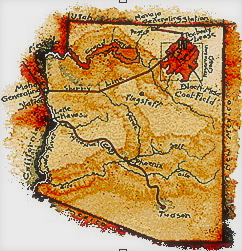 Navajo, or US governments, they are prohibited from making an economic livelihood for themselves. Tim Johnson, a resident of Dove Springs, explains how he’s not allowed to make any kind of profit because he is living on the ‘Hopi Partitioned Lands.’ People are not allowed economic development of any kind. That’s really choking you out”. The specific communities that we work with are those living in Coal Mine Mesa, Sand Springs, Tonalea-Red Lake, White Sands, Cactus Valley, Teestoh, Star Mountain, Big Mountain, Rocky Ridge, Mosquito Springs, Dove Springs, Red Willow Springs, Owl Springs, Cottonwood Springs, Jeddito, Lowe Mountain, Wide Ruins, and Thin Rock Mesa.
Navajo, or US governments, they are prohibited from making an economic livelihood for themselves. Tim Johnson, a resident of Dove Springs, explains how he’s not allowed to make any kind of profit because he is living on the ‘Hopi Partitioned Lands.’ People are not allowed economic development of any kind. That’s really choking you out”. The specific communities that we work with are those living in Coal Mine Mesa, Sand Springs, Tonalea-Red Lake, White Sands, Cactus Valley, Teestoh, Star Mountain, Big Mountain, Rocky Ridge, Mosquito Springs, Dove Springs, Red Willow Springs, Owl Springs, Cottonwood Springs, Jeddito, Lowe Mountain, Wide Ruins, and Thin Rock Mesa.
BMIS occasionally supports families located on the Navajo Partitioned Lands (NPL), especially those families affected by the encroaching mine and also affected by small grazing areas due to the fence.
DISTRIBUTING SUPPORT EFFORTS EVENLY: As directed by the families, we strive to distribute funds, donations, and supporters evenly- whether in the form of supplies, monetary donations, work crews, or sheepherders.
Distributing support between evenly means taking into consideration each family and or home-site, the various regions, clans, those who are considered ‘non-signers’ or ‘signers’, those who may be more prone to being forcibly removed, those who are elderly living alone, those who may be experiencing harassment (and theft such as livestock impoundment); requests, and folks who are going to meetings and organizing. Additionally, we often place womyn supporters with grandmothers, which also determines where support
We are a small organization and can only operate within each of our capacities. This means that we don’t get to everybody; furthermore, it can be one of the major challenges of being an all-volunteer organization. At times it means that there are three or four people doing the bulk of the coordinating. So this is yet another very important reason why BMIS and the support network needs to be working with organizers from these communities.
FUNDRAISING FOR BLACK MESA: PROJECTS AND WAYS TO SUPPORT: All of the projects are at the request and guidance of the community. All of the projects are at the request and guidance of the Dine’ communities. Our involvement and communication with community members helps maintain a check and balance for how funds are evenly distributed.
- Danny Blackgoat is currently bringing local indigenous youth to Black Mesa to work on hogans, repair community roads and work on other projects. With your support he intends on this being a continuing project.
- Inter-generational indigenous youth support program.
- Several local residents and relatives are organizing an event called ‘Honoring the Elders’. It is a community gathering and feast to honor the elders as well as to remember the elders who have passed.
- There are requests for mechanics to come to Black Mesa in support of the resisters. A project to fix many families vehicles spanning across Black Mesa ‘HPL’ lands.
- Sponsor Big Mountain resident Louise Benally so that she can attend the National Environmental Justice advisory conference at the end of October.
- Support Black Mesa residents who want to attend community prayer gatherings at the San Francisco Peaks.
- Assist residents in dealing with water and air issues at Black Mesa.
- Help local residents revive a local organization called ‘The Voices of the Land’, or to establish another organization that serves as a central voice for their communities to better deal with both the Navajo and Hopi tribes.
- Support local economy:
- Inquire about arts and crafts (rugs, sheepskins, wool & dyed yarns, jewelry) prior to your visit so that families can prepare and have them ready.
- Are you part of a food run? Then think ahead and put orders in with the organic farmers. Are you getting wood to multiple families? Purchase wood from relatives and pay them to deliver it. Please speak with us about tips.
- Sponsoring a gathering or meeting? Then purchase a sheep from a family and pay relatives to butcher and prepare food.
- Sponsor residents who want to attend gatherings, shareholder meetings, protests, and other peaking engagements.
- Specifically, support is needed to help residents travel to the upcoming protest against the States and Nation Policy Summit of the American Legislative Exchange Council (ALEC) near Phoenix, AZ. Help second generation resisters have a presence at the demonstrations in Nov 28 – Dec 3, 2011 so that they can represent their communities’ long struggle against colonial expansion and resource extraction. For more information on the protest, visit http://azresistsalec.wordpress.com/.
- To assist in covering the costs of livestock impoundments so that families can get their livestock back.
- Sponsor families to get to community meetings.
- Funds to help cover the cost of funerals.
- Organizing caravans of work crews to Black Mesa during the fall in preparation of the freezing winter temperatures and again, smaller work parties in the spring time.
- Funds to purchase wood from locals on Black Mesa, for wood permits so families will not get harassed for collecting firewood, or to cover the cost of gas specifically for collecting wood and chainsaw oil.
- Supplies for specific work projects that families have requested such as minor repairs of homes & livestock corrals, maintenance of roads, as well as food for the host family at gatherings.
- Sponsor relatives to drive around to check in with their families. Gas money and wear and tear on vehicles are costly!
- Check back here often for an ongoing NEEDS LIST (located on the BMIS website).
You can donate for any of these projects here: https://supportblackmesa.org/donate/. You can also choose to earmark specific projects for your donations.
IF YOU FUNDRAISE FOR YOURSELF to participate in work caravans or to stay with a family three weeks or longer: While we choose to build a culture of inclusiveness, we think it’s important for supporters who are not from Black Mesa to question your intentions for why you want to come. We especially welcome indigenous folks, people who are planning to be involved long term, folks who are deeply invested in and on the front-lines of movements for social, economic, environmental justice in their communities, and returning supporters.
It is essential that you make it absolutely clear that the money you are raising is not going directly to the elders and families resisting coal and forced relocation but for *you* to stay there X amount of weeks in support of those resistance communities. Talk about your connection with Black Mesa. If you are fundraising for gas and food money to get out yourself to Black Mesa please notify us prior. If you already know a family, consult with them.
Please communicate with BMIS (or other coordinating organization) about your stay on the land and we can give you an estimate of how much your stay will cost. If you fund raise more than what is needed, you can spend it on things the family needs or donate it to BMIS.
EQUITABLE FUNDRAISING:
BMIS & the regional grass-roots organizers that we count on are committed to creating a space that is grounded in anti-oppression principles. To actualize them, we’ve adopted an equitable fundraising model from the San Francisco Bay Area support group. In addition to fundraising for direct financial and material support to Dine’ elders & families in resistance at Black Mesa, we encourage you to consider having ‘sponsorship fundraisers’ that offers sliding scale costs to participants who might not otherwise be able to come.
Being around the elders of Black Mesa and their inspiring example of 35-plus-years of resistance is an incredible privilege. Therefore we encourage fundraising for Indigenous people who want to come to Black Mesa. However, BMIS is unfortunately not in a position to offer scholarships as of Fall of 2011.
We think it is important that people with access to more resources are able to mobilize those resources to support working-class participation through sliding scale costs. This means having sliding scale costs for caravan participation. The participant expectations can be negotiated depending on what people are able to do, as these are general guidelines. If you adopt this model you must be absolutely clear in your fundraising efforts about it. Please talk with BMIS and/or coordinators in your region with any questions, comments, or concerns.
THE IMPORTANCE OF REPORTBACKS:
Bringing your experience back home also allows your community to understand where their donations are going and opens the door for transparency. Any fundraising you have done is a great opportunity to create strong ties between your experience on the land and the people who supported you in getting there. Report backs, brainstorms with your communities about how you can continue supporting the resisters on and around Black Mesa while living back home, supporting indigenous struggles where you live, and how you plan to return are ways to keep the dialogue open for long term support. Please keep us informed and let us know if we can support you in this endeavor. We look forward to seeing how supporters can integrate their experiences into their work and life!
FUNDRAISING GUIDELINES:
These guidelines are in the process of being developed with the guidance from the families and relatives of Black Mesa.
- If you are using BMIS’s name, website, literature, or tax exempt number please make sure that your event fits the mission and principles of BMIS.
- When you have a fundraising event idea, be sure to contact the families if you are already in contact with and/or BMIS so that we know money is being raised in the name of Big Mountain & surrounding communities of Black Mesa.
- Distinctly set yourself apart from charitable work. Be sure to include information and analysis regarding institutional racism.
- Be careful about stating ‘for Big Mountain’ but rather use more inclusive language such as Black Mesa communities impacted by forced relocation and coal mining, or Big Mountain & surrounding communities of Black Mesa, or the so-called Hopi-Partitioned-Lands communities.
- If you fund raise and give directly to a family, please let us know so we can focus resources elsewhere.
- To do direct, on-land support try to regularly check in with families as to what the needs of their communities are. Please ask your group and various families if your support efforts reflect the priorities in their community.
- Especially during a time of national caravans, specify who will be doing what fundraising, so that you don’t have sources who become overwhelmed or irritated by repeated solicitations from different people in our support network.
- Consider having ‘sponsorship fundraisers’ that offers sliding scale costs to participants who might not otherwise be able to come, especially relatives and indigenous organizers.
- When fundraising, consider the needs of those of us and our support networks whose finances are tight. Make events accessible by offering a sliding scale entrance fee ($3 to $10 for a benefit concert as an example). Raising awareness is just as important as raising money.
- If raising money for your travels to get to Black Mesa: You must make it absolutely clear that the money you are raising is not going directly to the elders and families resisting coal and forced relocation but for *you* to stay there X amount of weeks in support of those resistance communities.
- Please notify a family that you already know, BMIS, or your local coordinator prior to funding for yourself. If you raise more than what is needed, you can spend it on things the family needs or donate it to BMIS.
- Do a report-back in your community.
- Consider supporting local indigenous herbalists & health care practitioners as part of being an ally. Support their ongoing health care practices in their communities.
- If you aren’t already, try to collaborate with other community groups in your region, specifically indigenous communities. Consider doing joint benefits with local grassroots indigenous groups.
FUNDRAISING TIPS & RESOURCES:
- Host events, hit up non-profits, generous food vendors, and folks in your own networks.
- Especially when doing repetitive fundraising for big events like the fall caravan, collaborate with other community groups and put on events together, or see if there are ways to sell food or table at events that are already taking place. Check in with indigenous communities in your area. Consider doing joint benefits with local grassroots indigenous groups.
- Template Letter for Soliciting Donations (If you need our tax-ID # contact us)
- 8 ways to raise 2,500 in 10 days by Kim Klein & Stephanie Roth
- Organizing and Fundraising – Sisters In The Struggle by Vicki Quatmann
- Please Donate!
- Accountability Guidelines for supporting Black Mesa. (coming soon)
- Check out this excellent book: The Revolution Will Not Be Funded: Beyond the Non-Profit Industrial Complex by INCITE! Women of Color Against Violence
WE WELCOME YOUR INSIGHT:
This document is a work in progress and we hope it sparks a critical yet constructive dialogue concerning the challenges that we face as we engage in social transformation.
As we strive to be increasingly accountable with each other in this work, we welcome feedback, insights, advice, criticism and direction. Be on the lookout for a new document – guidelines for Black Mesa support, representation, & accountability. We acknowledge that we may not always agree with this feedback — and accountability does not require that we do so, but we will always listen to it, and seek to grow from it.
APPRECIATION & CLOSING:
As of the writing of these guidelines, BMIS is an organization comprised of white-privileged folks who are trying to be strong allies to the indigenous peoples of Black Mesa & beyond in the struggle against colonialism and oppression — and to free ourselves from these systems of conquest that we believe compromises the humanity of us all — We are especially grateful to those inspirational figures who have played such important roles in our lives, and have made our journey thus far possible. The list of names are too long to put here and we would not want to leave anybody out. They have taught, guided, and struggled with us as we’ve sought to become more effective advocates for justice and being people capable of acting in real solidarity with those who are the targets of system injustice every day. We give thanks to residents & relatives of Black Mesa, as well as several regional caravan coordinators without whom this letter could not be written without their support.
We dream of a social movement that will transform social, economic and political realities within our lifetimes for a healthy planet liberated from fossil fuel extraction, exploitative economies, colonialism, racism and all oppressions for our generation and generations to come.
This dream continues to awaken in our hearts, inspired by the on-going resistance of communities such as Black Mesa.
May the resistance of Big Mountain and surrounding communities on Black Mesa always be remembered, and supported!
Give back to the Earth! Give to future generations!
Sincerely,
The Black Mesa Indigenous Support Collective
https://supportblackmesa.org
blackmesais@gmail.com
Voice Mail: 928.773.8086
* Shinin’ the Light on White, Part One: White Privilege By Sharon Martinas
** From an essay by Stephanie Guilloud and William Cordery, Project South: Institute for the Elimination of Poverty and Genocide; The Revolution Will Not Be Funded – Beyond The Non-Profit Industrial Complex by INCITE! Women of Color Against Violence.
Support Front-Line Indigenous Communities of Black Mesa, AZ Resisting Massive Coal Mining!
Join the Caravan in Support of Indigenous Communities Who Are in Their Fourth Decade of Resisting Massive Coal Mining Operations on Their Ancestral Homelands of Big Mountain & Black Mesa, AZ. November 19th – 26th, 2011
Communities of Black Mesa Have Always Maintained That Their Struggle for Life, Land, & Future Generations Is For Our Collective Survival.
Greetings from Black Mesa Indigenous Support,
We are excited to once again extend the invitation from Dineh resisters of the Big Mountain regions of Black Mesa in joining a caravan of work crews in support of the on-going struggle to protect their communities, ancestral homelands, future generations and planet that we all share. These communities are in their fourth decade year of resistance against the US Government’s forced relocation policies, Peabody Coal’s financial interests, and an unsustainable fossil fuel based economy.
Participating in this caravan is one small way in supporting these courageous communities who are serving as the very blockade to massive coal mining on Black Mesa. The aim of th is caravan is to honor the requests and words of the elders and their families. With their guidance we will carry their wishes & demands far beyond just the annual caravans and link this struggle with social, environmental, and climate justice movements that participants may be a part of.
is caravan is to honor the requests and words of the elders and their families. With their guidance we will carry their wishes & demands far beyond just the annual caravans and link this struggle with social, environmental, and climate justice movements that participants may be a part of.
By assisting with direct on-land projects you are supporting families on their ancestral homelands in resistance to an illegal occupation and destruction of sacred sites by Peabody Energy. We will be chopping and hauling firewood, doing minor repair work, hauling water, road maintence, offering holistic health care, and sheep-herding before the approaching freezing winter months.
Indigenous nations are disproportionately targeted by fossil fuel extraction & environmental devastation; Black Mesa is no exception. Peabody Energy, previously Peabody Coal Company (the world’s largest private-sector coal company) is continuing to scheme for ways to continue their occupation of tribal lands under the guise of extracting “clean coal”.
Peabody’s Black Mesa mine has been the source of an estimated 325 million tons of greenhouse gases that have been discharged into the atmosphere.* In the 30+ years of disastrous operations, Dineh and Hopi communities in Arizona have been ravaged by Peabody’s coal mining. As a result of the massive mining operation, thousands of families have had their land taken away and been forcibly relocated. Peabody has drained 2.5 million gallons of water daily from the only community water supply and has left a monstrous toxic legacy along an abandoned 273-mile coal slurry pipeline. Furthermore, Peabody has desecrated & completely dug up burials, sacred areas, and shrines designated specifically for offerings, preventing religious practices. The continued mining by Peabody has devastating environmental and cultural impacts on local communities and significantly exacerbates global climate chaos.
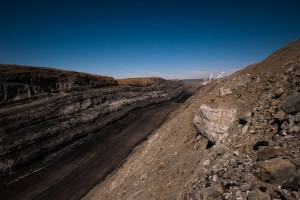
Relocation laws have made it nearly impossible for younger generations to continue living on their homelands. Institutional racism has fueled neglect and abandonment of public services such as water, maintenance of roads, health care, and schools. Many of the residents in the regions of Black Mesa that we’ll be visiting are elderly and winters can be extremely rough on them in this remote high desert terrain. Due to lack of local job opportunities and federal strangulation on Indian self-sufficiency, extended families are forced to live many miles away to earn incomes and have all the social amenities (which include choices in mandatory American education).
It is increasingly difficult for families to come back to visit their relatives in these remote areas due to the unmaintained roads and the rising cost of transportation. As one of their resistance strategies they call upon outside support as they maintain their traditional way of life in the face of the largest relocation of indigenous people in the US since the Trail of Tears.
Drawing on the inspiration of the elders & families of Black Mesa, they offer us a transformative model for the strategic, visionary change that is needed to re-harmonize our relationships with one another and with the planet. But too often Black Mesa becomes invisibilized as other human rights, environmental justice and climate justice struggles are showcased and highlighted in both the mainstream & progressive media.The truth is that all of these struggles are interconnected and central to our collective survival is the need to increase the visibility of struggles such as Black Mesa, a decades-long indigenous-led resistance to the fossil fuel industry, in related movements for human rights, environmental, climate & social justice.
May we stand strong with the elders & families of Black Mesa in their declaration that “Coal is the Mother Earth’s liver” and join them in action to ensure that coal remains in the ground! Families of Black Mesa are determined to repair and end the devastating impacts of colonialism, coal mining, and forced relocation of their communities, sacred lands, and our planet. False solutions to climate change and large scale coal extraction must be stopped!
Forging links between people grounded in movements based on social and ecological justice and the Black Mesa resisters (who are also grounded in these movements) is essential to address the disproportionate problems of poverty and disenfranchisement to achieve social, environmental, & climate justice.
On-Going Resistance To The Continued Desecration Of The Sacred San Francisco Peaks:
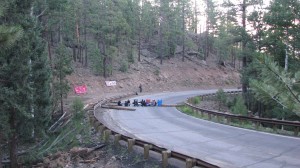 The struggle to protect the San Francisco Peaks is part of an international movement to protect sacred sites and is intricately connected with the struggle to protect the sacred places of Big Mountain & Black Mesa, AZ. The San Francisco Peaks has considerable religious significance to thirteen local Indigenous nations (including the Havasupai, Dine’ {Navajo}, Hopi, and Zuni.) In particular, it forms the Dine’ sacred mountain of the west, called the Dook’o’oosłííd.
The struggle to protect the San Francisco Peaks is part of an international movement to protect sacred sites and is intricately connected with the struggle to protect the sacred places of Big Mountain & Black Mesa, AZ. The San Francisco Peaks has considerable religious significance to thirteen local Indigenous nations (including the Havasupai, Dine’ {Navajo}, Hopi, and Zuni.) In particular, it forms the Dine’ sacred mountain of the west, called the Dook’o’oosłííd.
In recent months the San Francisco Peaks has been desecrated by Arizona Snowbowl Ski Resort with permission from the US Forest Service by cutting 40 acres of pristine forest and laying miles of pipeline to spray artificial snow made of sewage water that would be bought from the City of Flagstaff. In response, there has been a convergence on the peaks to protect what has yet to be desecrated and create a long term form of protection for the Mountain including demonstrations, encampments, multiple lockdowns, further litigation, and tribes filing a human rights complaint with the United Nations.
If you’re visiting Black Mesa, then you will be likely be traveling through the vicinity of the holy San Francisco Peaks which is located just outside of Flagstaff, AZ. Stay posted for updates & how you can support the protection of the Peaks at http://www.truesnow.org and http://www.indigenousaction.org
Support the Action in Stopping the American Legislative Exchange Council (ALEC) “States & Nation Policy Summit” in Scottsdale, AZ; Nov 30 – Dec 2, 2011:
ALEC- a conglomerate of legislators and corporate sponsors is planning to meet for their “States and Nation Policy Summit” just outside of Phoenix, AZ (Scottsdale) from November 30-December 2, 2011 . “The group’s membership includes both state lawmakers and corporate executives who gather behind closed doors to discuss and vote on draft legislation. ALEC has come under increasing scrutiny in recent months for its role in crafting bills to attack worker rights, to roll back environmental regulations, privatize education, deregulate major industries, and pass voter ID laws”.** Arizona politicians and the private prison industry, under ALEC, finalized the model legislation which became SB 1070, the harshest anti- immigrant measure in the country and a license for racial profiling.
Thanks to ALEC, at least a dozen states have recently adopted a nearly identical resolution asking Congress to compel the U.S. Environmental Protection Agency to stop regulating carbon emissions (which they recently did): http://www.democracynow.org/2011/9/7/smog_v_jobs_is_obama_admin”.
A Peabody Energy representative is on the Corporate Board of ALEC. Kelly Mader, the Vice President of State Government Affairs at Peabody was given ALEC’s 2011 Private Sector Member of the Year Award. In these closed door ALEC meetings, it is no wonder that corporations such as Peabody serve state legislators their agendas on legislation which directly benefit their bottom line. Mader is due to attend the ALEC meeting in Phoenix.
Families of Black Mesa may need supporters to watch over their home and animals so that they can attend the ALEC demonstrations. Please contact BMIS if you can help with this as well as additional logistics such as funds, transportation, and lodging. Thank you!
The struggles on Big Mountain are directly connected to the struggles on the San Francisco Peaks and the movement to stop ALEC. Stay tuned for possible actions and protests in support of struggles to protect ancestral homelands & sacred sites, to stop corporate profiteering off the exploitation, suffering and degradation of us all -particularly indigenous peoples, migrants, the working class, prisoners, and essentially all of Mother Earth.
“Arizona Says NO to Criminalization, Incarceration, & Corporate Profiteering at the Expense of Our Communities” http://azresistsalec.wordpress.com/ *
For additional info on ALEC: http://alecexposed.org/wiki/ALEC_Exposed
Ways you can support:
- Join the Caravan: Connect with a coordinator or create a work crew in your region. Contact BMIS so that we can connect you with others who may be in your region. So far caravan coordinators are located in Prescott, Phoenix and Flagstaff, AZ; Denver, CO; Santa Cruz, CA; Eugene and Portland, OR; and the San Francisco’s Bay Area. Meeting locations and dates will be posted on the BMIS website & our facebook page as coordinators set them up. This caravan will be in collaboration with the annual Clan Dyken Fall Food and Supply Run on Black Mesa. It is of the utmost importance that each guest understands and respects the ways of the communities that we will be visiting. Prior to visiting Black Mesa, all guests must read and sign the Cultural Sensitivity & Preparedness Guide: https://supportblackmesa.org/tag/cultural-sensitivity/
-
BMIS List of Regional Coordinators for the Fall 2011 Caravan
- Flagstaff, AZ: Beth elavely@gmail.com
- Albuquerque, NM: Derek blackmesais@gmail.com
- Prescott, AZ: Ian Christopher grey.sky.magpie@gmail.com
- Santa Cruz, CA: sheepandsagebrush@gmail.com
- Bay Area, Ca: bayareacaravan@gmail.com
- Denver, CO: Shannon rezchix@gmail.com & Leah misskittiedee@hotmail.com
- Maine: Emma emma@beehivecollective.org
- Minneapolis, MN: Kelly nancydrew@riseup.net
- Eugene, OR: OR4BlackMesa@gmail.com
- Host or attend regional organizational meetings in your area: We strongly urge participants to attend or organize regional meetings. Due to the large number of caravan participants in past years, we are limiting the number to just under 100 this fall. Please register early and plan on attending meetings held in your region. There you’ll engage in political education work and help regional coordinators plan logistics, fundraisers, and collect donated food and supplies ahead of time.
- Trucks, chainsaws, & supplies are integral to the success of the caravan. The more trucks we have, the more wood, water and other heavy loads we can transport. Axes, mauls, axe handles, shovels, tools of all kinds, organic food, warm blankets, and did we mention trucks? — either to donate to families or to use for the week of the caravan–are greatly needed on the land to make this caravan work! We’ve got a 501-C3 tax-deductible number, so if you need that contact us. Please keep checking the BMIS website for an ongoing list of specific requestsby Black Mesa residents.
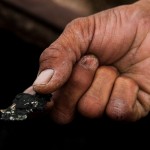
- Challenge Colonialism! One of our main organizing goal’s is to highlight anti-colonial education within all the regional meetings leading up to the caravan. In addition to the Cultural Sensitivity Guide, we encourage you to bring articles, films, and other resources to your regional meetings & host discussions that further our collective understanding for transforming colonialism, white supremacy, genocide, & all intersections of oppression. We have started a resources list, which is now on the website. Feel free to share with us any resources that you like so that we can build upon this list & strengthen our growing support network! In addition please check out our Points Of Unity.
- Fundraise! Fundraise! Fundraise! As a grassroots, all-volunteer network, we do not receive nor rely on any institutional funding for these support efforts, but instead count on each person’s ingenuity, creativity, and hard work to make it all come together. We are hoping to raise enough money through our community connections for gas, specifically for collecting wood and food for host families, and for work projects. Host events, hit up non-profits, generous food vendors, and folks in your own networks. An article that we want to highlight is ‘8 Ways to Raise $2,500 in 10 Days’. Check our website soon for our this document, fundraising guidelines, a donation solicitation template letter, and more. You can Donate here: https://supportblackmesa.org/donate/
- Stay with a family any time of the year: Families living in resistance to coal mining and relocation laws are requesting self-sufficient guests who are willing to give three or more weeks of their time, especially in the winter. Contact BMIS in advance so that we can make arrangements prior to your stay, to answer any questions that you may have, and so we can help put you in touch with a family. It is of the utmost importance that each guest understands and respects the ways of the communities that we will be visiting. Prior to visiting Black Mesa, all guests must read and sign the Cultural Sensitivity & Preparedness Guide: https://supportblackmesa.org/tag/cultural-sensitivity/
Give back to the Earth! Give to future generations!
May the resistance of Big Mountain and surrounding communities on Black Mesa always be remembered, and supported!
With love,
Black Mesa Indigenous Support
Black Mesa Indigenous Support (BMIS) is a grassroots, all-volunteer collective committed to supporting the indigenous peoples of Black Mesa in their resistance to massive coal mining operations and to the forced relocation policies of the US government. We see ourselves as a part of a people powered uprising for a healthy planet liberated from fossil fuel extraction, exploitative economies, racism, and oppression for our generation and generations to come. BMIS stands with the elders of Black Mesa in their declaration that “Coal is the Mother Earth’s liver” and joins them in action to ensure that coal remains in the ground.
Address: P.O. Box 23501, Flagstaff, Arizona 86002
Voice Mail: 928.773.8086
Email: blackmesais@gmail.com
Web: www.supportblackmesa.org
Facebook: Black Mesa Indigenous Support
*Black Mesa Water Coalition
**Democracy Now!
Black Mesa Caravan Projects Needs List
Latest needs as of 09.24.2010: Please continue to check out this list, as it may change and grow as we get closer to the dates of the caravan.
- A covering for a large dome for meetings. Either re-purchase another one from Pacific Domes or get the materials.
- Supporters to come early to help prepare the grounds for the gathering.
- Materials prior to the caravan to re-build outhouses and storage houses. Wood, nails, a toilet seat, pick axe, shovels, maybe paint, etc.
- Fencing Material
- Long-time organizer from Big Mountain, Louise Benally, requests a truck or other vehicle.
- Chainsaws!!
- Experienced or practiced chainsaw operators.
- Chainsaw files and bar/chain oil.
- Axe and Maul HANDLES. Wood is preferable over fiberglass.
- Axes and mauls.
- Website/tech support, please! Email program support as well.
- Lap-tops.
- Wood, if local.
- Hay.
- Building materials: Lumber, fencing, roofing materials, tar paper, nails, screws, boxes of screws, nails, & chalking, rolls of barbed wire,fence posts, leather gloves, etc.
- Funds or sponsorships for building materials.
- Vehicles to donate to families. Vehicles that are able to drive on rough terrain. Trucks are the best but not necessary.
- Trucks to use during the week of the caravan.
- Tools of all kinds: Shovels, hoes, rakes, hammers, hand saws, hand shears, picks, mattocks, posthole diggers, and extra tool handles.
- Portable generators.
- Work gloves.
- Portable stove / propane tanks, large pots to use during the caravan.
- Food. Especially organic fruits and veggies.
- Organic coffee and tea.
- Water barrels, fittings, pumps.
- Solar panels, generators, wind turbines.
- Anyone who is self sufficient, has an open heart, and with a willingness to work! And anyone who is skilled in carpentry, permaculture, vehicular repairs, bodyworkers, electrical, etc. please notifiy coordinators. Consider driving your vehicle, vehicles are always needed to pull the caravan off.
- Medicinal herbs. (Teas, dried herbs, fresh extracts, liniments, and salves for stress, colds & flus, digestion, arthritis, diabetes, altitude sickness, back-aches. Please contact Dixie with BMIS.)
- Blankets.
- Educational books for both youth and adults.
- Solar parts (batteries)
- Donate money for the caravan to happen.
- Bring money for supporting the local arts and crafts made by families.
A Petition From The Big Mountain Situation
Ladies & Gentlemen, the Old, the Young, the Coming Generation, and Relatives:
As we speak, there exist a state of fear and anxiety in a traditional community at Big Mountain in the heart of Black Mesa. And as we speak, the federally deputized officers of the BIA Hopi Agency Police and Rangers are patrolling this region where a few traditional elders continue to live and also resist federal mandates to relocate. I want to bring your attention to one particular situation that is an example of the wide-spread acts of injustice, human rights violation, religious intolerance, and threats of property destruction. Read more
Protesting is not Resisting, Resistance are based on Profound Manifestos:
Protesting is not Resisting, Resistance are based on Profound Manifestos: “Ancient Big Mountain Supreme Ways Dictates Dineh Resistance, Pauline Whitesinger Continues to Defy B.I.A. Police Harassment & Threats”
By Bahe Y. Katenay, Sheep Dog Nation Rocks
Sweet Water Stronghold, Big Mountain. February 9, 2009 – Dineh elder resister of the traditional lands of Sweet Water is bundled up for the chilly winds as she takes some hay out to her sheep and goats. The herds need a little extra feed before going out to graze. The non-Indian, volunteer supporter is dressed warm and ready to follow the sheep as he chops some wood for grandma, Pauline and while the herds nibble on the scattered hay on the ground. Not many non-Indian volunteers do occasionally make themselves available from their busy lives to come out for short stays and help traditional, elder resisters. Very few traditional elder residents are now left throughout such regions affected by the harsh relocation laws of 1974.mercury in flu shots Soap Note On Tamiflu swine flu protection
flu prevention signs? Flu Treatment who makes tamiflu
tamiflu cdc Pharmacist Role In Flu Tamiflu cdc swine flu prevention
tamiflu effective Canada Pharmacy No Prescription Required For Tamiflu mercury in flu shots
buy tamiflu no perscription Flu Shot Treatment For Multiple Sclerosis tamiflu suspension?
Achat tamiflu acheter tamiflu 174. How Does Flu Affect Hearing Gastric flu treatment generic version of tamiflu 937.
best flu treatments Swine Flu Maps swine flu h1n1
ap news tamiflu Tamiflu History 2009 flu season update
tamiflu purchase Tamiflu And Pregnancy tamiflu canada
“cold and flu prevention and treatment” Most Effective Antiviral For The Flu swine flu treatments
Shelf life of tamiflu side effects of tamiflu 651. Herbal Homeopathic Treatment For Swine Flu stomach flu 2009 boulder county schools!
tamiflu pregnancy Flu Symtoms flu protection
chilli cold and flu treatment; How Long Will Tamiflu Last Storage flu symptoms,
tamiflu shelf life Symptons Of Swine Flu san luis potosi swine flu
false flu security What Are Flu Symptoms how does tamiflu work
swine flu pandemic Tamiflu Off The Shelf symptons of swine flu
avian flu Lemon Cold And Flu Treatment tamiflu for swine
stomach flu symptoms Flu Treatment For Pediatrics tamiflu or relenza
Read more
Demonstration for Black Mesa March 7th 2009 in Stockholm Sweden and Petition
soap note on tamiflu Stomach Flu And Treatments incubation period for swine flu
swine flu cases! California Swine Flu tamiflu suspension?
how is the swine flu transmitted Tamiflu Producer swine flu origin
flu symtoms Relenza Vs Tamiflu stopped tamiflu early;
roche tamiflu Swine Flu Death swine flu
tamiflu rumsfield? 2009 Flu Multnomah County Oregon rumsfeld tamiflu
flu prevention signs? History Physical Template For Tamiflu tamiflu without a prescription
flu treatment Acheter Tamiflu swine flu prevention kits
“buy tamiflu w/ no prescription” Side Effects Of Tamiflu flu symptoms,
alendronic acid tamiflu Swine Flu Italy san luis potosi swine flu
swine flu cartoon Swine Flu In Cancun What are some treatments of swine flu what are the ingredients 969.
flu mask p95 Tamiflu Not Effective H5n1 cold and flu remedy
order tamiflu Tamiflu Related To Disasters tamiflu pregnancy
can you get better from h1n1 without tamiflu Tamiflu No Prescription comprar tamiflu!
Acheter tamiflu alendronic acid tamiflu 14. Rumsfeld Tamiflu there is no treatment for swine flu
how long does the flu usually last! Flu Activity swine flu cdc?
tamiflu or relenza What Is Tamiflu tamiflu for children
Read more
